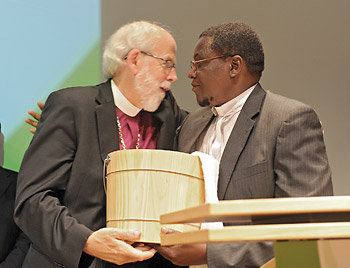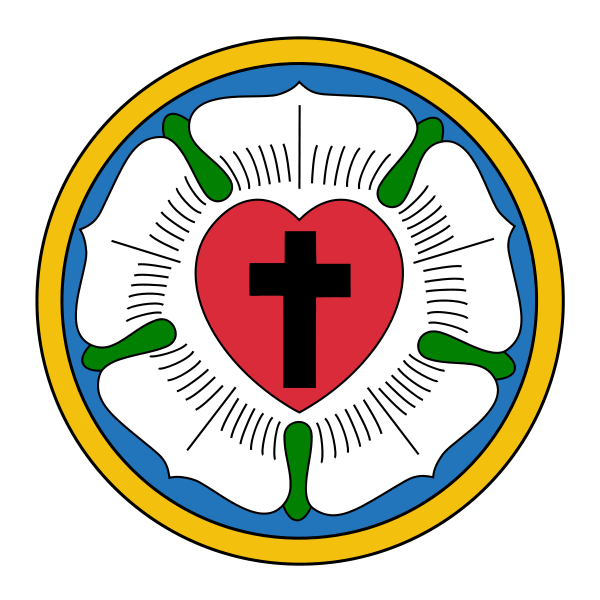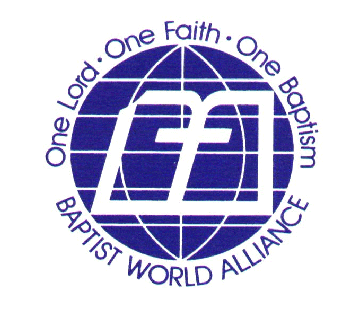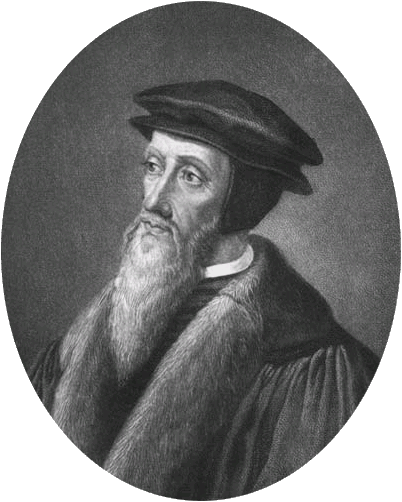Difference between revisions of "Ecumenical Dialogue"
| Line 113: | Line 113: | ||
| ''Bericht vom Dialog VELKD/Mennoniten, 1989 bis 1992'' (Hannover, 1993). || | | ''Bericht vom Dialog VELKD/Mennoniten, 1989 bis 1992'' (Hannover, 1993). || | ||
|- | |- | ||
| − | | Burkart, Rainer W. “Eucharistische Gastfreundschaft. Versöhnung zwischen Mennoniten und Lutheranern,” '' | + | | Burkart, Rainer W. “Eucharistische Gastfreundschaft. Versöhnung zwischen Mennoniten und Lutheranern,” ''Ökumenische Rundschau'' 45 (July 1996), 324-330. || |
|- | |- | ||
| Burkholder, J. R., ''Mennonites in Ecumenical Dialogue on Peace and Justice'' (MCC, Occasional Papers, Nr. 7, 1988). || | | Burkholder, J. R., ''Mennonites in Ecumenical Dialogue on Peace and Justice'' (MCC, Occasional Papers, Nr. 7, 1988). || | ||
|- | |- | ||
| − | | Burkholder, J.R. “Witness to the State: A Mennonite Perspective.” In ''Prophetic Peacemaking: Selected Writings of J.R. Burkholder,'' | + | | Burkholder, J.R. “Witness to the State: A Mennonite Perspective.” In ''Prophetic Peacemaking: Selected Writings of J.R. Burkholder,'' ed. Keith Graber Miller, 147-156. Scottdale, Pa.: Herald Press, 2010.|| Burkholder presented this paper at a Goshen College symposium hosting radical Catholic peace activists and social thinkers. He argues that the Anabaptist pacifist tradition should be taken seriously alongside traditional (Catholic, Lutheran, Calvinist) or then popular (Christian realist) views. He highlights commonalities between his Mennonite perspective and the radical Catholic minority represented at the symposium. |
|- | |- | ||
| “Burkholder Represents Mennonites in Ecumenical Peace Conversations.” ''Mennonite Reporter'' XVIII, no. 2 (Jan. 18, 1988), 8. || | | “Burkholder Represents Mennonites in Ecumenical Peace Conversations.” ''Mennonite Reporter'' XVIII, no. 2 (Jan. 18, 1988), 8. || | ||
| Line 127: | Line 127: | ||
| ''Dopers-Calvinistische Gesprek in Nederland'' [Mennonite-Reformed Dialogue in the Netherlands] (The Hague: Boekencentrum, 1982). || Conversations extended from 1975-1978 (included 3 from Neth. Reformed Church; 3 Dutch Menn; 2 Reformed church in the Neth; 2 Baptists; 1 Christian Ref. Church); 6 main themes. | | ''Dopers-Calvinistische Gesprek in Nederland'' [Mennonite-Reformed Dialogue in the Netherlands] (The Hague: Boekencentrum, 1982). || Conversations extended from 1975-1978 (included 3 from Neth. Reformed Church; 3 Dutch Menn; 2 Reformed church in the Neth; 2 Baptists; 1 Christian Ref. Church); 6 main themes. | ||
|- | |- | ||
| − | | Durnbaugh, Donald F., ed. ''On Earth Peace: Discussions on War/Peace Issues Between Friends, Mennonites, Brethren, and European Church, 1935-75''. Elgin, Ill.: Brethren Press, 1978. || | + | | Durnbaugh, Donald F., ed. ''On Earth Peace: Discussions on War/Peace Issues Between Friends, Mennonites, Brethren, and European Church, 1935-75''. Elgin, Ill.: Brethren Press, 1978. || This is an important collection including primary sources (conference papers, published statements, etc.) on Anabaptist involvement in ecumenical discussions on peace and justice in the early-mid 20th century. |
|- | |- | ||
| Ecumenical Council of Churches in the Czech Socialist Republic. ''Czech Ecumenical Fellowship.'' Translated by Leonord and Karel Stradal. Praha, 1981. || | | Ecumenical Council of Churches in the Czech Socialist Republic. ''Czech Ecumenical Fellowship.'' Translated by Leonord and Karel Stradal. Praha, 1981. || | ||
|- | |- | ||
| − | | Enns, Fernando. “Believers Church Ecclesiology: A Vital Alternative within the Ecumenical Family.” In ''New Perspectives in Believers Church Ecclesiology'', | + | | Enns, Fernando. “Believers Church Ecclesiology: A Vital Alternative within the Ecumenical Family.” In ''New Perspectives in Believers Church Ecclesiology'', ed. A.Dueck, H.Harder, K.Koop, 107-124. Winnipeg/Manitoba: CMU Press, 2010. || |
|- | |- | ||
| Enns, Fernando. ''Friedenskirche in der ökumene: Mennonitische Wurzeln einer Ethik der Gewaltfreiheit'' (Göttingern: Vandenhoeck & Ruprecht, 2003). || This is by far the most sophisticated and informed survey of Mennonite ecumenical conversations – both historically and theologically. | | Enns, Fernando. ''Friedenskirche in der ökumene: Mennonitische Wurzeln einer Ethik der Gewaltfreiheit'' (Göttingern: Vandenhoeck & Ruprecht, 2003). || This is by far the most sophisticated and informed survey of Mennonite ecumenical conversations – both historically and theologically. | ||
| Line 137: | Line 137: | ||
| Enns, Fernando. ''The Peace Church and the Ecumenical Community: Ecclesiology and the Ethics of Nonviolence.'' Translated by Helmut Harder. Kitchener, Ont.: Pandora Press, 2007. || English translation of the German text cited above. | | Enns, Fernando. ''The Peace Church and the Ecumenical Community: Ecclesiology and the Ethics of Nonviolence.'' Translated by Helmut Harder. Kitchener, Ont.: Pandora Press, 2007. || English translation of the German text cited above. | ||
|- | |- | ||
| − | | Enns, Fernando. “Die gegenseitige Anerkennung der Taufe als bleibende ökumenische Herausforderung: Konsens, Divergenzen und Differenzen. In ''Profilierte Ökumene''. | + | | Enns, Fernando. “Die gegenseitige Anerkennung der Taufe als bleibende ökumenische Herausforderung: Konsens, Divergenzen und Differenzen. In ''Profilierte Ökumene,'' ed. Fernando Enns, Martin Hailer, and Ulrike Link-Wieczorek. Frankfurt am Main: Otto Lembeck, 2009. || |
|- | |- | ||
| Enns, Fernando; Hans-Jocken Jaschke; and Arbeietsgemeinschaft Mennonitscher Gemeinden in Deutschland. Gemeinsam berufen, Friedensstifter zu sein: zum Dialog Zwischen Katholiken und Mennoniten. Schwarzenfeld: Neufeld Verlag, 2008. || Also published under the same title by Bonifatius Verlag, 2008. | | Enns, Fernando; Hans-Jocken Jaschke; and Arbeietsgemeinschaft Mennonitscher Gemeinden in Deutschland. Gemeinsam berufen, Friedensstifter zu sein: zum Dialog Zwischen Katholiken und Mennoniten. Schwarzenfeld: Neufeld Verlag, 2008. || Also published under the same title by Bonifatius Verlag, 2008. | ||
| Line 149: | Line 149: | ||
| Enns, Fernando. “The Peace Church: Dialogue and Diversity in the Ecumenical Movement.” ''Conrad Grebel Review'' 23, no. 3 (Fall 2005), 4-19. || | | Enns, Fernando. “The Peace Church: Dialogue and Diversity in the Ecumenical Movement.” ''Conrad Grebel Review'' 23, no. 3 (Fall 2005), 4-19. || | ||
|- | |- | ||
| − | | Enns, Fernando. “Towards an Ecumenical Theology of Just Peace at the Conclusion of the ‘Decade to Overcome Violence.’” In ''After Violence: Religion, Trauma and Reconciliation,'' | + | | Enns, Fernando. “Towards an Ecumenical Theology of Just Peace at the Conclusion of the ‘Decade to Overcome Violence.’” In ''After Violence: Religion, Trauma and Reconciliation,'' ed. Andrea Biehler, Christian Bingel, Hans-Martin Gutmann, 198-218. Leipzig: Evangelische Verlagsanstalt, 2011. || |
|- | |- | ||
| Enns, Fernando. “We are the World Council of Church.” ''Ecumenical Review'' 58, no. 3-4 (July-October 2006), 287-290. || | | Enns, Fernando. “We are the World Council of Church.” ''Ecumenical Review'' 58, no. 3-4 (July-October 2006), 287-290. || | ||
| Line 155: | Line 155: | ||
| Erb, Paul. ''Orie O. Miller: The Story of a Man and an Era.'' Scottdale, Pa.: Herald Press, 1969. || Erb credits Orie Miller with initiating the first serious Mennonite ecumenical involvement in the modern era through his efforts to strengthen Mennonite peace theology and share it with other Christians. | | Erb, Paul. ''Orie O. Miller: The Story of a Man and an Era.'' Scottdale, Pa.: Herald Press, 1969. || Erb credits Orie Miller with initiating the first serious Mennonite ecumenical involvement in the modern era through his efforts to strengthen Mennonite peace theology and share it with other Christians. | ||
|- | |- | ||
| − | | Fast, Heinold. “A Mennonite View on the Reformed Condemnations,” in Hans Georg von Berg, et al., | + | | Fast, Heinold. “A Mennonite View on the Reformed Condemnations,” in ''Mennonites and Reformed in Dialogue,'' ed. Hans Georg von Berg, et al., 57-60. Geneva: 1986. || |
|- | |- | ||
| − | | Finger, Tom. “A Mennonite Theology for Interfaith | + | | Finger, Tom. “A Mennonite Theology for Interfaith Relations,” in ''Grounds for Understanding: Ecumenical Resources for Responses to Religious Pluralism'', ed. S. Mark Heim, 69-92. Grand Rapids: Eerdmans, 1998). || |
|- | |- | ||
| Finger, Tom. “An Anabaptist Perspective on Justification,” in M. Opocensky & P. Reamonn, eds., JUSTIFICATION AND SANCTIFICATION IN THE TRADITIONS OF THE REFORMATION (Geneva: World Alliance of Reformed Churches), 44-86 [= Prague V Conference Presentation] || | | Finger, Tom. “An Anabaptist Perspective on Justification,” in M. Opocensky & P. Reamonn, eds., JUSTIFICATION AND SANCTIFICATION IN THE TRADITIONS OF THE REFORMATION (Geneva: World Alliance of Reformed Churches), 44-86 [= Prague V Conference Presentation] || | ||
Revision as of 01:18, 8 November 2012

Ecumenical Dialogue Between Mennonites and Other Christian Faith Traditions
This site, currently under construction, offers a window into the relatively recent involvement of Mennonite (and Anabaptist-related groups) in ecumenical involvements of various sorts. Some expressions of Mennonite ecumenicity have emerged in response to formal invitations from other Christian groups seeking a "healing of memory" in light of the conflict that surrounded our origins in the 16th century. Other ecumenical engagements have been more informal--lay initiatives seeking deeper understanding and reconciliation at a local level. This site provides access to bibliographic information on Anabaptist-Mennonite ecumenical involvements, texts of working papers and formal statements, an overview of the emerging reception history and links to other resources. Please add additional relevant information based on your own interest and expertise!  Mennonite World Conference President Danisa Ndlovu of Zimbabwe presents Lutheran World Fellowship President Bishop Mark S. Hanson with a wooden foot-washing tub to represent Mennonites' commitment to a future “when the distinguishing mark of Lutheran and Anabaptist-Mennonite relationships is boundless love and unfailing service” in Stuttgart, Germany.[1] Interchurch and Interfaith DialogueOver the years, Mennonite Church USA, Mennonite Church Canada and other Mennonite organizations like Mennonite World Conference have engaged in conversation between other Christian churches and denominations.
LutheransStuttgart 2010 (Documents, News Releases, International Reception)"STUTTGART, Germany (RNS/ENInews) A global Lutheran assembly in Germany has asked for forgiveness for the 16th-century persecution of Anabaptists, the religious reformers whose modern-day descendants include Mennonites. “We remember how Anabaptist Christians knew suffering and persecution, and we remember how some of our most honored Reformation leaders defended this persecution in the name of faithfulness,” said Bishop Mark Hanson, president of the Lutheran World Federation, at a joint service of repentance with Mennonites on July 22." Excerpt taken from The Christian Index, accessed here. ELCA-MCUSA Conversations, 2002-2004 (Documents, News Releases, Reception)Representatives of the Mennonite Church USA (MCUSA) and the Evangelical Lutheran Church in America (ELCA) met in Goshen, Indiana February 21-24, 2002, beginning the first in a series of dialogues between the two denominations. Included in this round of conversation were reflections upon the Protestant Reformation, the experience of each church in the North American context, and the role and authority of confessional writings. A key element in the dialogue was an examination of the persecution of Anabaptists by Lutherans and others, and the healing of those painful memories. In the course of this first round, the dialogue explored each church’s hermeneutic for interpreting Scripture, the role and authority of Church structures, and the relationship between Church and state. From February of 2002 until March of 2004, topics included baptism, the Lord’s Supper, nonresistance and non-violence, pacifism and the Gospel of peace, anthropology and free will, and others. Throughout the dialogue, members of congregations were given opportunities to meet with and discuss these issues as the group sought to deepen levels of trust and cooperation between our two church bodies. Their continued hope is that our deepening fellowship will strengthen both faith communities for mission in the world.[3] BaptistsSeventh-Day AdventistsRoman Catholic Church"A dialogue between Catholics and Mennonites took place over a five-year period, from 1998-2003. The general purpose of the dialogue was to get better acquainted, to better understand Catholic and Mennonite positions on Christian faith and to contribute to overcoming long-held prejudices. Under discussion were the intersection of the history of the two denominations; theology around the nature of the church, sacraments and ordinances and the commitment to peace; and addressing the healing of memories."[4] Reformed ChurchChurch of GodTri-Lateral Dialogue on BaptismLocal and Grassroots InitiativesBridgefolk"Bridgefolk is a movement of sacramentally-minded Mennonites and peace-minded Roman Catholics who come together to celebrate each other's traditions, explore each other's practices, and honor each other's contribution to the mission of Christ's Church. Together we seek better ways to embody a commitment to both traditions. We seek to make Anabaptist-Mennonite practices of discipleship, peaceableness, and lay participation more accessible to Roman Catholics, and to bring the spiritual, liturgical, and sacramental practices of the Catholic tradition to Anabaptists." (Excerpt taken from the official Bridgefolk website.) "Heal Our Land" Conference"From May 1-4, 2003, in a conference center at Winterthur, in the mountains of Switzerland, over 1000 Christians from all over the world met to joyfully worship, prayerfully seek and faithfully obey the God who heals our land by healing our broken relationships. This “Heal Our Land” conference was sponsored by the Stiftung Schleife, a Christian ministry devoted to serving the body of Christ and headed by Geri Keller, a Swiss Reformed minister." (Excerpt taken from "Come, Father, Heal Our Land.") "A Swiss Reformed pastor for thirty years has carried a burden for reconciliation between these two groups. Geri Keller, founder of a parachurch ministry called Stiftung Schleife, organized the conference. There were many Anabaptists who attended from Switzerland, Germany, France, Austria, Belgium and other parts of Europe, as well as Canada. The Swiss Reformed church was represented by approximately forty Reformed pastors and many lay people, who joined together for the four-day conference. Forty Amish from Montana and Idaho and seventeen Mennonites from the Lancaster and Franconia, PA areas were invited to participate in the conference. My wife Janet and I attended, representing Mennonites from the Franconia Mennonite Conference area. The total number of persons attending the conference exceeded 800." (Excerpt taken from "500-Year Old Swiss Wound Had to be Healed.") Anabaptist Connections"Anabaptist Connections" is comprised of two teams, both Amish and Mennonite. These two teams have committed to work together in a covenant relationship. For the first time in Anabaptist history have Amish and Mennonites come together in overcoming ancient animosities and divisions, to work as a corporate team in forging healing and forgiveness." (Excerpt taken from the Anabaptist Connection website.) "Unlocking our Inheritance" ConferenceSwiss Reformed Pastors and Leaders met together with Anabaptists from all denominations, April 7-9, 2005 in New Holland, Pa. "Unification of all believers in Jesus Christ was a theme of the opening session of a three-day conference titled “Unlocking the Inheritance.’’ Despite differences, Hoover said, all in attendance are united in Christ. Forgiveness and healing were related themes. The Swiss traveled here to ask for forgiveness from Mennonites, Amish, Brethren and other Anabaptists and to heal relationships with them." (Excerpt taken from "Going about the Business of Forgiveness.") See also: "Anabaptists, Swiss Persecutors will make Amends - 500 years later." Ecumenical Gatherings in Germany and SwitzerlandGrassroots ecumenical activity between Mennonites and other Christian groups is ongoing in Germany and Switzerland, notably in the work of Mennonites in ecumenical organizations like Church and Peace, and also in the public programming of the Arbeitsstelle Theologie Der Friedenskirche (Center for Peace Church Theology) at the University of Hamburg, led by Fernando Enns, a scholar specializing in Mennonite ecumenical activity and theology. Mennonite World Conference also participates in ecumenical gatherings in Germany and Switzerland Examples from 2012 include theological dialogue between Mennonites and Seventh Day Adventists in Basel on May 28-30 , and a joint meal and worship service between Mennonite World Conference and Lutheran World Federation on September 16 in Bad Oldesloe. To keep up-to-date and view archived press releases, visit http://www.mennonews.de Mennonite Ecumenical Thought and Practice: A Working BibliographyClearly this a draft in progress! Please enter additional citations or send them to johndr@goshen.edu.
|



